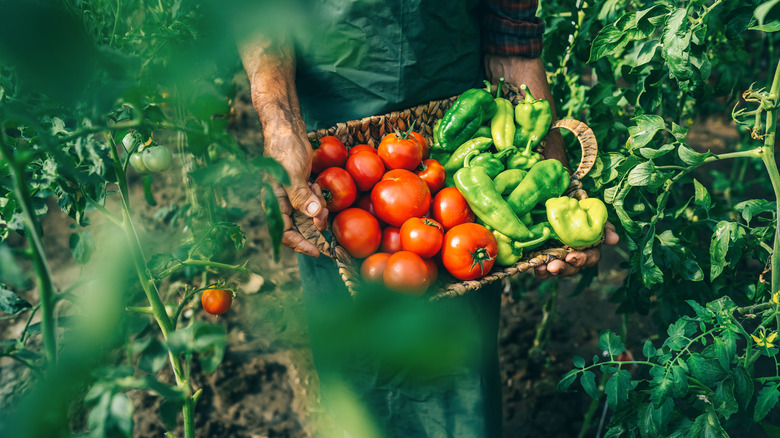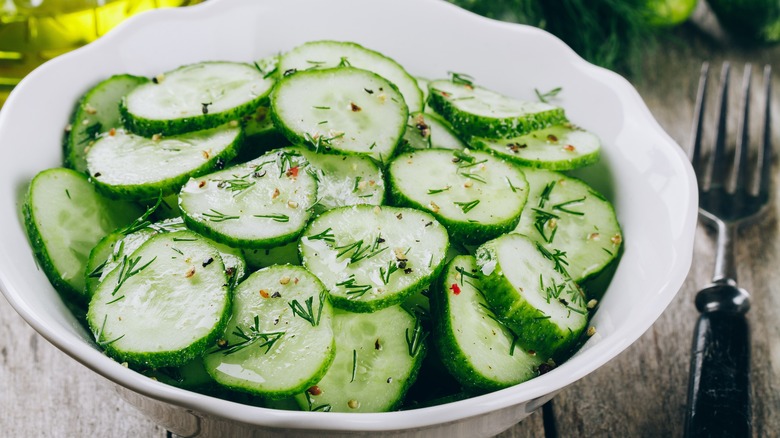Avoid Eating These Salad Ingredients Every Day If You Have This Medical Condition
It's not every day that you're told to be careful about eating salads. They're a great source of antioxidants and other helpful nutrients that your body needs. We're talking vitamin A, vitamin C, beta-carotene, calcium, folate, fiber, and phytonutrients.
But turns out, certain medical conditions — more specifically, heartburn — could be exacerbated if you don't pay attention to what's on your salad. Yes, we're referring to salad dressings. High-fat and high-sugar foods are ingredients you don't want to see in your salad dressing. "This slows down the digestion process or makes it difficult to break down food properly — resulting in the extra production of stomach acid," explained registered nutritionist Jay Cowin (via She Finds). If you're thinking about store-bought creamy salad dressings, there might be other additives in there that could make your indigestion worse too.
Vinegar is also a concern with salad dressings. Highly acidic foods like vinegar can be a common trigger when it comes to acid reflux and heartburn. Heartburn is that burning sensation you feel when your stomach acids travel up to your esophagus. Being overweight, having bacterial infections, taking certain medications like ibuprofen, being pregnant, having gastroesophageal reflux disease (GERD), and having stomach ulcers can lead to heartburn.
Apart from problematic ingredients in your salad dressing, there are some ingredients that make up your salad itself that you need to be mindful of.
Salad ingredients to avoid if you have heartburn
While salads with alkaline-rich ingredients can be especially good for heartburn, there are some ingredients you need to avoid eating. We're talking acidic tomatoes; fried croutons (or anything else fried); allium vegetables like onions, garlic, and shallots; citrus fruits; processed foods; and spicy ingredients like peppers. The fermented fibers in allium vegetables can lead to more stomach acid production and spicy vegetables that contain capsaicin can slow down your digestion, both of which could irritate your stomach and lead to heartburn.
Moreover, even lettuce and asparagus were found to be problematic for people with heartburn and reflux, according to a 2017 study published in Minerva Medica. But the science behind lettuce and asparagus seems divided with some experts recommending them as safe, if not, healthy options too.
Perhaps, when it comes to the less obvious salad ingredients to avoid eating, a little trial and error is in order.
Salad ingredients to eat if you have heartburn
High-fiber fruits and vegetables that don't go on the "avoid" list are a safe bet.
You also want to be adding water-rich leafy greens like spinach, cucumbers, zucchini, and celery into your salads. Watermelons are a tasty addition too. They help dilute those problematic stomach acids and prevent heartburn. The goal is to include non-acidic or alkaline fruits and vegetables in your salads. Bananas, cantaloupe, melon, apples, cauliflower, nuts, and legumes make up the list. Root vegetables like sweet potatoes, carrots, and beets plus whole-grain ingredients like brown rice and couscous are also stomach-friendly options.
As for salad dressings to choose for heartburn, making your own at home is a good way to avoid (accidentally) eating any ingredients that could make things worse. Reduced-fat mayonnaise, non-fat buttermilk, low-fat yogurt, and extra virgin olive oil are safe options. Again, it might take some trial and error to figure out what ingredients to put on your salad and what things to avoid. That being said, certain gastrointestinal medical conditions like inflammatory bowel disease (IBD) or irritable bowel syndrome (IBS) that have heartburn as a symptom could be exacerbated by high-fiber diets, especially during a flare. Discuss eating salads with your healthcare provider if you have an underlying health condition like one of these.



